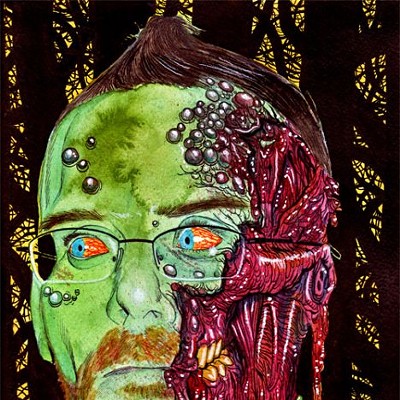I don’t often write about music for this column, but it’s not often that a musical icon steeped in science fiction dies days before I write Geek Speak. I’m talking, of course, about David Bowie, Ziggy Stardust himself, a man whose first hit was about an astronaut who was never coming home, a man who turned himself into a Martian for his first masterpiece, a man who always had one foot in outer space. Specifically, today I’m talking about Low, an album that isn’t overtly science fiction in the way that some of his others were, but an album that still strikes me as cooly futuristic and alien almost forty years after its release.
It’s not the obvious choice for a tribute to a man whose first classic album,The Rise and Fall of Ziggy Stardust and the Spiders from Mars, was a concept album about a Martian rock star. As great as that album is — and yeah, it’s as good as they come — its science-fiction trappings feel dated to me. Hell, they felt dated to me when I discovered the album in high school, two decades ago — just a bunch of Buck Rogers-era cliches grafted onto an archetypal rock star. That’s not to denigrate the album — it’s an unassailable classic without a disposable song to be found — but it’s just a rock album with some ray guns and space ships for decoration. It must have seemed revolutionary and wild the day it was released, but by the time I came across it, hair metal had taken all its worst impulses and turned them up to eleven and Star Wars had changed the baseline for science fiction in a way that made the album a relic of the past. It sexuality was still revolutionary then — hell, it is to this day — but its sci-fi was not.
Low, however … Low is still out of this world, whether that was ever the intent or not.
The album’s opening side is mostly pop songs, along with two poppy instrumentals to open and close the side. That said, they are weird pop songs. One of them, “Sound and Vision,” was a legitimate hit, but even it’s pretty weird. They’re angular, prickly pop songs, with inscrutable lyrics and weird moods. All the familiar elements of pop songs are there — hooks, choruses, melodies, harmonies — but they all rub up against each other in odd, unsettling ways that strip them of the comforting familiarity we expect from pop. They often feel like songs from a distant future, beamed backwards in time, and they’re wonderful for it. If the second side were more of the same, Low would still be one of my favorite Bowie album, but it isn’t. It’s something entirely different, and that’s why the album is my favorite Bowie album, bar none.
Slow, dense and dark, the second side of Low is a masterwork of otherworldly sound. Synthesizers dominate and the “real” instruments are mostly so treated and altered as to sound even more alien than the synthesized timbres. On those few occasions Bowie lends his voice to the mix, it is in twisted, slippery bursts, singing wordless intonations, nonsense syllables or disconnected words that are beautiful and disorienting. The pace is measured, even stately, throughout the side, giving it the slow inevitability of atomic decay.
At times, any of the tracks can seem welcoming, even comforting, but it’s a slippery comfort that easily turns to icy dread and paranoia, reflective of your own mood and headspace. For me, much of the beauty and timelessness of the album comes from this mutability. On one listen, I can close my eyes as side two plays and picture the dystopian sprawl of Blade Runner, all chrome and flashes of neon light with a patina of decay and filth over everything. On the next, I imagine it the soundtrack of a solo flight through the deepest reaches of space, the cold, steely synthesizers propelling me through stygian void to a destination unknown and possibly unreachable. It is music that rewards repeated, deep listens — hell, it almost demands them — and it always affects me deeply, no matter how many times I return to it. For me, it will always be the definitive Bowie album.
When I heard Bowie had passed, my mind filled with his music. It wouldn’t stop, and for the past several days, my brain has played a nearly ceaseless selection of his work, both hits and deep cuts, even if I was trying to listen to something else of his. It wasn’t until I settled in with Low today that I was able to clear my head and really listen to a song that wasn’t being played in my brain. As always, it was a beautiful and sometimes dark experience, and as the cryptic ending of the closer “Subterraneans” swelled, I was able to accept he was gone, and blessed silence returned to my brain for the first time in days as I said goodbye.
[
{
"name": "Air - MediumRectangle - Inline Content - Mobile Display Size",
"component": "12017618",
"insertPoint": "2",
"requiredCountToDisplay": "2"
},{
"name": "Editor Picks",
"component": "17242653",
"insertPoint": "4",
"requiredCountToDisplay": "1"
},{
"name": "Inline Links",
"component": "18838239",
"insertPoint": "8th",
"startingPoint": 8,
"requiredCountToDisplay": "7",
"maxInsertions": 25
},{
"name": "Air - MediumRectangle - Combo - Inline Content",
"component": "17261320",
"insertPoint": "8th",
"startingPoint": 8,
"requiredCountToDisplay": "7",
"maxInsertions": 25
},{
"name": "Inline Links",
"component": "18838239",
"insertPoint": "8th",
"startingPoint": 12,
"requiredCountToDisplay": "11",
"maxInsertions": 25
},{
"name": "Air - Leaderboard Tower - Combo - Inline Content",
"component": "17261321",
"insertPoint": "8th",
"startingPoint": 12,
"requiredCountToDisplay": "11",
"maxInsertions": 25
}
]











